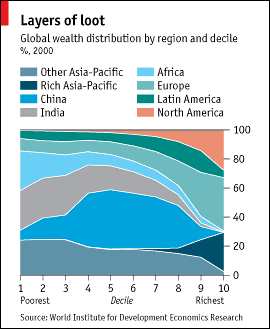Sharing Nugget #41
Allow me to share this great piece from The Economist. I will let it speak for itself.
(http://www.economist.com/finance/displaystory.cfm?story_id=E1_RPRNPPG): Exclusive content to Subscribers.
The wealth of nations: Winner takes (almost) all
Dec 7th 2006 From The Economist print edition
The other half live with less than $2,161 to their name
MUCH of Adam Smith's classic treatise on the “Wealth of Nations” is not really about wealth at all, but about income. The two concepts are different: income is the flow of money a nation or household receives in a year; wealth is the stock of assets it has accumulated over its life so far, minus its debts.
The difference matters but how much so is hard to say. The global distribution of income has been noisily debated; the distribution of wealth ignored. Economists can talk (and argue) only about what they can measure, and whereas they struggle to measure global income inequality, they have barely ventured to do the same for wealth. Until now.
The World Institute for Development Economics Research (WIDER) in Helsinki this week released a bold attempt to measure how personal wealth (which includes financial assets, real estate, consumer durables and even livestock) was distributed around the world in 2000.
Britain, Sweden and America have been counting their wealth for a century or more. Other high-income countries have been tallying it for decades. But it was not until three populous, poorer countries—China, India and Indonesia—began surveying household wealth that a global reckoning became thinkable.
Whether even now it is quite doable remains a matter of judgment. The authors have numbers, sometimes patchy, for just 38 countries. For the remaining 191, they have to “impute” wealth, based on how they compare with the countries they do know something about.
What do they find? If you had more than $2,161 (measured by official exchange rates) in 2000, you belonged to the wealthier half of the human race. Were you lucky enough to own more than $515,000, you could hobnob with the top 1% (although this is a “far from exclusive club”, containing 37m adults). The top ranks are still dominated by the Americans, Japanese and Europeans (see chart). China occupies the middle ground. Wealth is shared much less equitably than income: more than half of it is held by just 2% of the world's adults. The distribution is equivalent to a world of ten people, in which one had $1,000 and the other nine had $1 each.
Many people in poor countries have next-to-nothing; but quite a lot of people in rich countries have less than that: their liabilities exceed their assets. For example, the bottom half of Swedes have a collective net worth of less than zero. That said, the Nordic countries seem to thrive without much personal wealth. Finland, for example, has wealth per head (measured in terms of purchasing-power parity) of under $39,000, less than South Korea. The Finns' entitlement to a generous state pension and other largesse counts for more than a nest egg to call one's own.


